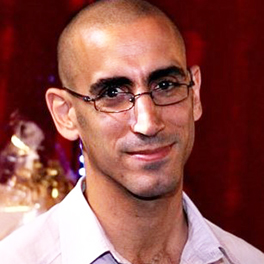Dr. Itamar Levi Battles Data Leakage from Electronic Components

The chip provides protection at a much lower cost – in terms of area, energy consumption and performance – than anything currently offered on the market
Credit purchases via cellphone, saving and processing private information on the server, a pacemaker based on a simple processor, a system of sensors and controllers connected to a factory network – all of these are examples of computer-based platforms with electronic processing. All of them carry sensitive, intimate information, and naturally, the need arises to secure the information they process. “My research focuses on how to design our electronic friends in a way we can trust them,” says Dr. Itamar Levi, who had joined the Computer Engineering program at the Faculty this past October. “In theory, it’s simple: patterns of secret-keeping systems (or any other cryptographic need) always rely on some grain of secretly-kept information, such as a secret key. The problem is that our systems are not theoretical: the very realization of the system in the physical world leads to secret data leakage, whether it is or isn’t being used – and that’s just one of many problems.”
Levi, married and father to Arad and Negev, lives in Lehavim. He earned his BSc and MSc in Electrical Engineering and Computers at Ben Gurion University’s direct track, and his PhD right here in our Faculty, before heading out to do his postdoctoral research at UCLouvain in Belgium. He specializes in data leakage solutions for electronic components from hardware to software. “We already know how to provide pretty decent solutions in the electronic world, ones that make attackers who seek information put in considerable effort and resources, much like cryptographic needs in the theoretical world,” explains Dr. Levi. “But even if the systems of tomorrow are biological, photonic, mechanical or sub-nanometric – processing the data they carry consumes energy, and this energy always manifests in the real world in a way that can be easily measured or sensed.”
Per Levi, popular data leakage solution requires the expansive use of random numbers – entropy – “Generally, you use randomness at the cryptographic algorithm level, introduce randomness to mathematical calculations, or to randomize machine commands operands and execution-time or lastly, in actually making electronic level processing seem random. We do that to make it hard for an attacker to understand the meaning of a seemingly random leakage he senses.” The problem lies in the fact that more randomness is needed, so does the need for computing power to generate it, process it, or extract random numbers from physical phenomena. “In the real world, more calculations mean longer computing and iteration times (with a processor, for example), or plenty of hardware space (integrated circuits, for example). It’s a critical issue and therein lies the real challenge: cost and application. The cost of the algorithms and solutions we offer is tremendous and too expensive to implement, which often leaves the user with a solution that is far less secure than needed.”
At his lab, SelecSys (Secured Electronic Systems), Levi focuses on cost-reducing solutions – number of calculations, performance times, energy, and area – and also validate the level of security at the time of planning. “Moreover, we provide indices and criteria as to what ‘safe’ means and how it’s measured,” he explains. Research at the lab is multidisciplinary, from mathematics and statistics through theoretical and applied cryptography and attacks, engineering, computer and processor architecture, and all the way up to electronics, nano-electronics, and measurements. The actual work is diverse, and students can focus on theoretical aspects, experiments (measurement and working with electronics, optics, sensors, etc.) or a little of everything. “I’m looking for bright, open-minded students with broad shoulders to lead processes, who are driven and independent thinkers,” says Levi. “I believe without a doubt that what makes research excellent, especially in a world of security and secrecy, is getting down to details: leaving no stone unturned, while still knowing how to make problems more abstract and solve them on that level.”
Sounds demanding? Levi guarantees that all that hard work comes with great excitement when the time comes to test a system that much time and effort was put into its modeling, analysis, and execution – and see that it works just as it should. “When we get a system and can say that within the scope of our assumptions and models is safe for X years, that a user can use it on their phone, car or pacemaker and be certain that no sensitive information can be extracted from it – the satisfaction is phenomenal,” says Levi. “One recent example is an electronic chip that uses the advanced Onion technology, which I started developing during my postdoctoral studies at Belgium and was partially measured here at Bar-Ilan. The chip executes many cryptographic algorithms and provides a known and well-analyzed level of defense at a much lower cost in terms of area, energy consumption, and performance – than anything currently offered on the market.”
Last Updated Date : 03/06/2020



